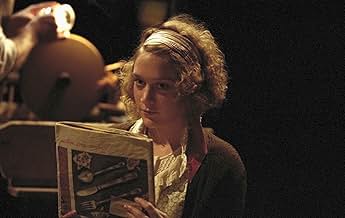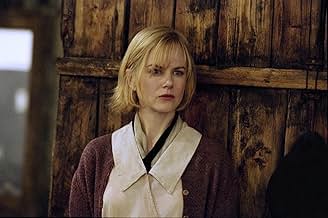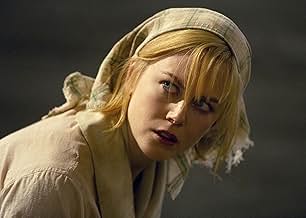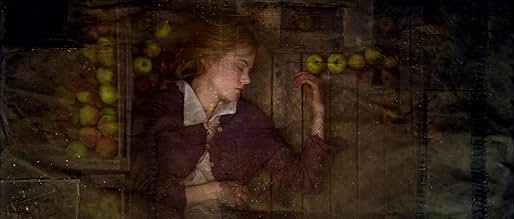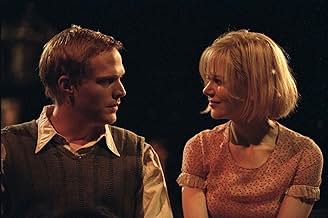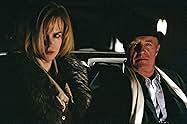Eine Frau auf der Flucht vor Gangstern wird eher widerwillig von den Bewohnern einer kleinen Stadt in Colorado aufgenommen. Im Gegenzug verpflichtet sie sich, für die Gemeinschaft zu arbeite... Alles lesenEine Frau auf der Flucht vor Gangstern wird eher widerwillig von den Bewohnern einer kleinen Stadt in Colorado aufgenommen. Im Gegenzug verpflichtet sie sich, für die Gemeinschaft zu arbeiten. Als ein Suchtrupp die Stadt durchkämmt, muss sie herausfinden, dass die Unterstützung d... Alles lesenEine Frau auf der Flucht vor Gangstern wird eher widerwillig von den Bewohnern einer kleinen Stadt in Colorado aufgenommen. Im Gegenzug verpflichtet sie sich, für die Gemeinschaft zu arbeiten. Als ein Suchtrupp die Stadt durchkämmt, muss sie herausfinden, dass die Unterstützung der Dorfbewohner ihren Preis hat. Zudem hütet sie ein gefährliches Geheimnis.
- Auszeichnungen
- 21 Gewinne & 33 Nominierungen insgesamt
Empfohlene Bewertungen
I have a natural dislike for films that come across as pretentious or arty for art's sake, so you can imagine I approached this film with slight trepidation despite not having seen any clips of it. However, I did really like the film and was surprised just how quickly the three hours flew by. In terms of the plot, it is more than up to the task of the three-hour running time - in fact I (and most of the audience) stayed in my seat until the very last credit had run over great photographs and the great Bowie's `Young Americans'. The plot is good enough to be accepted but you do need to see past the script and look at what it is saying to appreciate it - although having said that it would still grip me even if it hadn't made me think.
Leaving the cinema I felt that I hadn't really bought the film's moral that nobody is really `good' because I felt that most people are not bad, and certainly not to this extent; but I think my mind was stuck on the specifics of the film rather than the meaning. In the film everyone is socially polite and restrained, but once the chance to take advantage comes, it is increasingly taken (albeit to extremes). I felt the film was particularly harsh to Tom, who was actually a `good' person - however I think time has allowed me to understand it better. We are not good people. We do take advantage of others, whether it be individuals (while trying to keep up our good public image as much as we want) or groups. Even those who turn a blind eye are `bad' simply because they could have acted for good and they didn't.
I saw this film two weeks after illegal immigrants drowned in the UK while picking cockles for very, very low wages - they were caught in mudflats by the rising tide. While the obvious `bad' people are those who made them work like this, many others knew of the work and ignored it. More pertinently to the film is the fact that a vulnerable and needy group were exploited by society - just as Grace was here. I didn't get the photographs over the end credit (I was into the music!) but they were all of the poor or minorities etc on the fringe of society - I found this challenging. When many of us see people in need we will do enough to look `good' and keep our social niceties (ie put a £ in the cup) just like those in Dogville did. We all feel good after this, but this film challenges that idea of `good' as wholly inadequate and that just being polite and moving on is still `bad' even if it is on a sliding scale. This is not to say that the film's plot and themes are perfect, but even flawed they are clear and will keep you thinking of the film long after it ends.
Of course it is unrelentingly bleak for the entire second half, but this is the film and I had to accept it for what it was. In terms of being arty, I found the bleak stage to work very well. The only downside of it was cuts from very black scenes to white scenes hurt my eyes in the cinema. This is not just theatre being filmed, the film uses the lack of scenery well. Sure it focuses the attention on the actors, but it also highlights how the people turn a blind eye. In my favourite shot, a rape occurs in one `house' and the camera shoots it through all the others, they are unable to hide from it even if they don't look - it is a very simple way of showing the audience that everyone knows but is socially polite. The film still uses makeup and props except for, inexplicably, Nicole Kidman herself. She starts the film looking good but ends it looking as good - when really she would have looked tired or bedraggled and destroyed.
In fairness Kidman manages to do that without makeup and her performance is very good throughout the film - it is easy to dismiss hers and the other stars' roles as some sort of justification of themselves as `real artists' but it was still a brave move for a business that is more about dollars than art. The rest of the cast more than match her and I was surprised to see so many big names. Bettany is very good as are Bacall, Hall, Ivanek, Sevigny and Skarsgård. Even the child actor is very self-assured and Hurt's homely narration is colourful and funny. Ironically the two black characters have little to do - the script says they are there as a token indication of Edison Sr's open-mindedness, but it is almost like they were token at times - sadly Shims' whole contribution is going `shhhh' twice! Despite that there are no weak links, the acting is superb and it certainly appears as if von Trier's aim of stripping the film away to focus on performances has paid off in a big way. Acting awards may not come but I have not seen more daring performances from a Hollywood cast for quite a while.
Overall this is a bleak and challenging film - not only to watch but to think about and apply to myself too. I left the cinema enjoying it but disagreeing with it's moral point of view, however I allowed myself to look and I now agree with it, as sad as that sounds. As a story and a film it is wonderful; the fact that it has come to the multiplexes' forcing thought and emotion is even better. The saddest thing is that so many teenagers at the screening I was in walked out - they saw something they were not used to and they rejected it within 30 minutes; I find that horribly depressing.
The story is simple, a young woman who it appears is on the run from the mob seeks refuge in a small town known as Dogville. The residents who are initially wary of her soon warm to her and welcome her into their midst. This however, comes with a price she must do small favours in return for refuge. Inevitably greed, desire and mistrust take over the residents which corrupts them and has devastating consequences for all involved.
The dramatic shift in the mentality of the townspeople is so well handled and expertly crafted by Von Trier, that it makes the emotional payoff which one receives at the end of this film even greater. It is utterly compelling and has universal themes. Ultimately, this is a film which may serve as a cautionary tale for all self-proclaimed 'civilised' societies and as a treatise upon karmic retribution.
The story itself is a brilliant lesson in human behavior.
Wusstest du schon
- WissenswertesPaul Bettany didn't want to play Tom Edison, because they were shooting it in Sweden. Then his friend Stellan Skarsgård told him that Lars von Trier's shoots were so funny, that "you'll miss something extraordinary if you turn the part down." After shooting half the movie, Bettany asked Skarsgård when the fun would start, to which Skarsgård replied: "I lied. I did it because he is amazing to work with, and you wouldn't be able to see that before you were actually here yourself. I wanted to give you a chance, and you wouldn't have shown up if I had been frank with you."
- PatzerJack refers to the steeple casting a shadow which touches the O of the store's open sign at exactly 5 PM each day. This would actually only occur on a few days each year, as the lengths and positions of shadows are constantly changing through the seasons.
- Crazy CreditsClosing credits play over photographs depicting crime and poverty in the United States.
- Alternative VersionenTo fit the needs of some local distributors, in Italy among others, assistant director Anders Refn cut a version of Dogville which is about 45 minutes shorter than the original. The version was accepted and approved by director Lars von Trier.
- VerbindungenFeatured in Trier, Kidman og Cannes (2003)
- SoundtracksYoung Americans
Written and Performed by David Bowie
Courtesy of RZO Music, Inc.
Published by Chrysalis Music Limited / EMI Music Publishing Limited / RZO Music Limited
[Played over end credits]
Top-Auswahl
- How long is Dogville?Powered by Alexa
Details
- Erscheinungsdatum
- Herkunftsländer
- Offizielle Standorte
- Sprachen
- Auch bekannt als
- U - Der Film 'Dogville' erzählt in neun Kapiteln und einem Prolog.
- Drehorte
- Produktionsfirmen
- Weitere beteiligte Unternehmen bei IMDbPro anzeigen
Box Office
- Budget
- 10.000.000 $ (geschätzt)
- Bruttoertrag in den USA und Kanada
- 1.535.286 $
- Eröffnungswochenende in den USA und in Kanada
- 88.855 $
- 28. März 2004
- Weltweiter Bruttoertrag
- 16.690.617 $
- Laufzeit2 Stunden 51 Minuten
- Farbe
- Sound-Mix
- Seitenverhältnis
- 2.35 : 1



